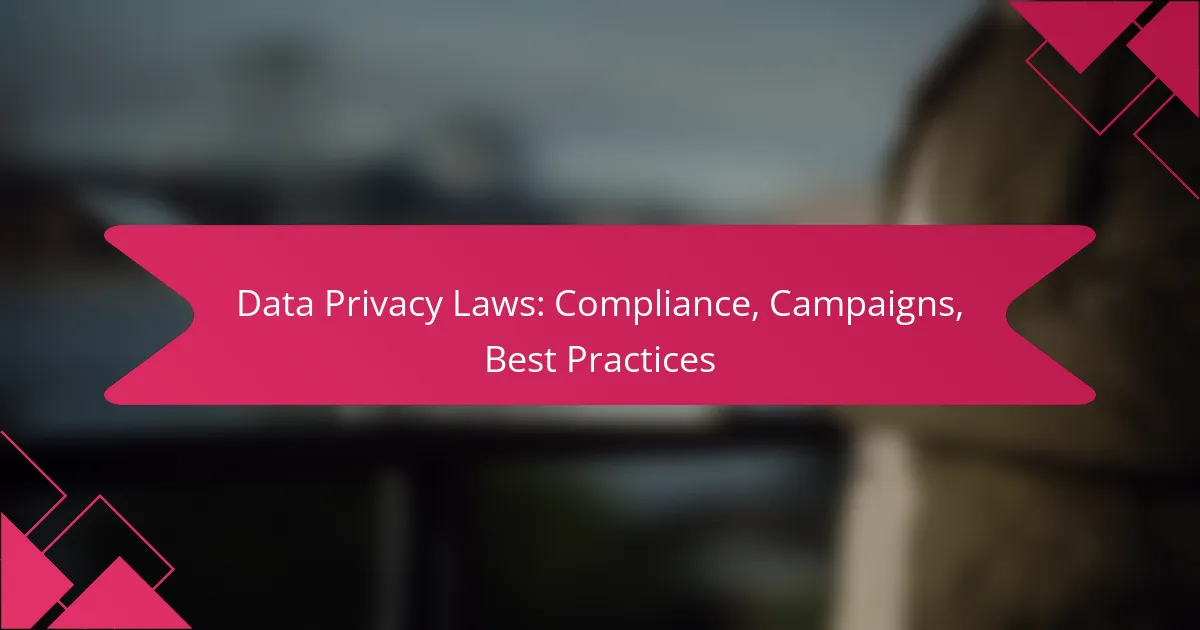Data privacy laws are crucial for organizations to navigate the complexities of handling personal information while maintaining consumer trust. Compliance with regulations such as the CCPA and GDPR is essential to avoid legal penalties and foster transparency. By adopting best practices in data privacy campaigns, businesses can effectively manage consent, engage customers, and ensure ongoing adherence to these regulations.
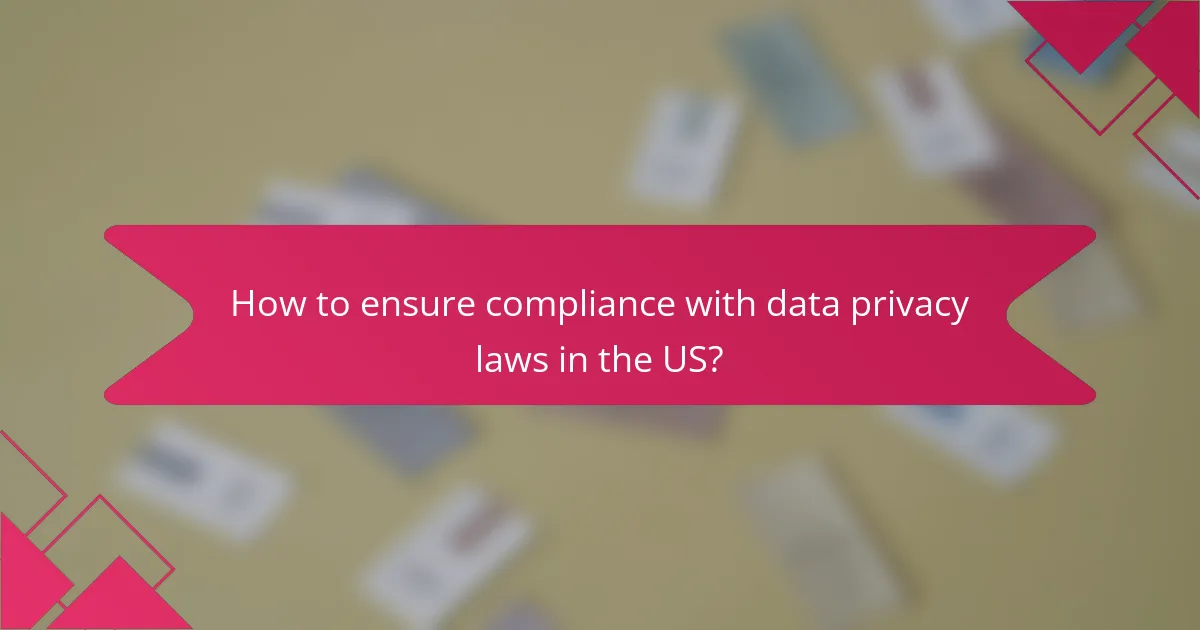
How to ensure compliance with data privacy laws in the US?
To ensure compliance with data privacy laws in the US, organizations must understand and implement relevant regulations, conduct regular audits, and maintain transparency with consumers. Key laws like the CCPA and principles from GDPR provide a framework for managing personal data effectively.
Understand the California Consumer Privacy Act (CCPA)
The CCPA is a significant regulation that grants California residents specific rights regarding their personal information. Businesses that meet certain thresholds must disclose data collection practices and allow consumers to opt-out of data selling.
To comply, familiarize your organization with the CCPA requirements, including the definitions of personal information and the rights afforded to consumers. Regularly review your data practices to ensure alignment with these regulations.
Implement GDPR principles for US operations
Even though GDPR is a European regulation, its principles can enhance data privacy practices in the US. Key aspects include obtaining explicit consent for data processing and ensuring data minimization—only collecting what is necessary.
Adopting GDPR principles can help organizations build trust with consumers and prepare for potential future regulations in the US that may mirror GDPR standards. Consider implementing data protection by design and default as part of your operational strategy.
Conduct regular data audits
Regular data audits are essential for identifying compliance gaps and ensuring that data handling practices align with legal requirements. These audits should assess data collection, storage, and sharing practices.
Establish a routine schedule for audits, such as quarterly or biannually, and involve cross-functional teams to provide comprehensive insights. Document findings and take corrective actions promptly to mitigate risks.
Develop a privacy policy
A clear and accessible privacy policy is crucial for transparency and compliance. This document should outline how your organization collects, uses, and protects personal data, as well as the rights of consumers.
Ensure that the privacy policy is easy to understand and available on your website. Regularly update it to reflect changes in data practices or legal requirements, and notify users of significant updates.
Train employees on compliance
Employee training is vital for fostering a culture of data privacy and ensuring compliance with laws. All staff should understand their roles in protecting personal information and the implications of non-compliance.
Provide regular training sessions and resources on data privacy laws, best practices, and internal policies. Consider implementing a certification program to reinforce knowledge and accountability among employees.
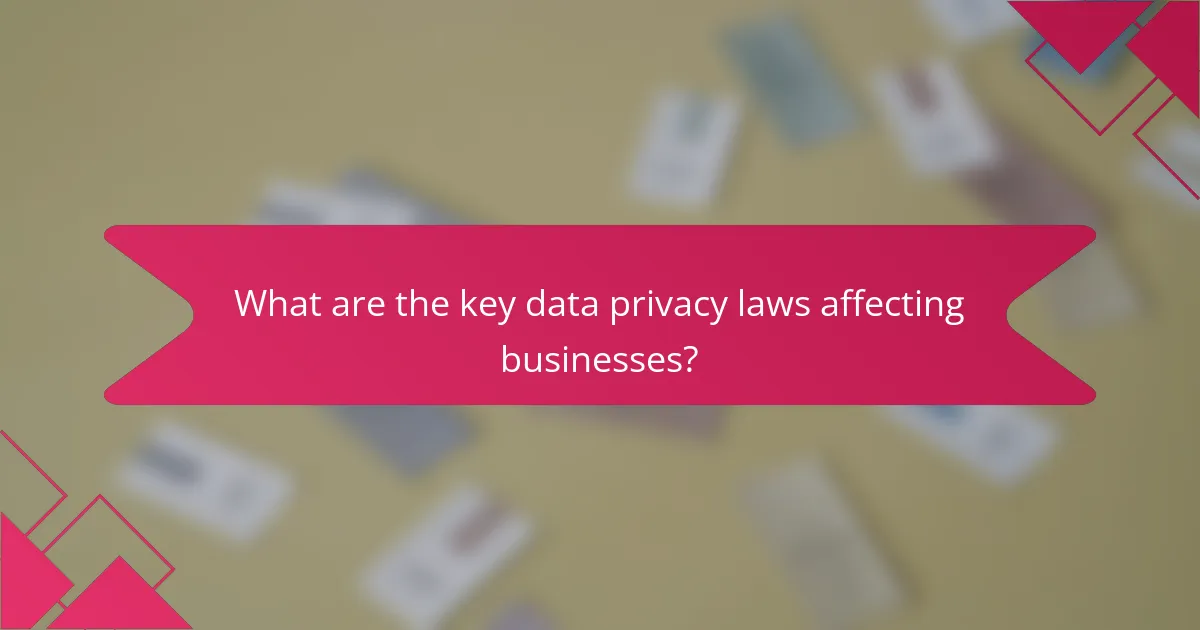
What are the key data privacy laws affecting businesses?
Key data privacy laws significantly impact how businesses handle personal information. Compliance with these regulations is essential to avoid legal penalties and maintain consumer trust.
General Data Protection Regulation (GDPR)
The GDPR is a comprehensive data protection law in the European Union that governs how personal data is collected, processed, and stored. It emphasizes the rights of individuals, giving them control over their personal information, including the right to access, rectify, and erase their data.
Businesses must ensure they have a lawful basis for processing personal data, such as consent or legitimate interest. Non-compliance can result in hefty fines, reaching up to 4% of annual global turnover or €20 million, whichever is higher.
California Consumer Privacy Act (CCPA)
The CCPA provides California residents with rights regarding their personal information held by businesses. It allows consumers to know what data is being collected, the purpose of its collection, and the ability to opt-out of the sale of their data.
Companies must implement processes to respond to consumer requests and update their privacy policies accordingly. Violations can lead to fines of up to $7,500 per intentional violation, emphasizing the need for robust compliance measures.
Health Insurance Portability and Accountability Act (HIPAA)
HIPAA is a U.S. law that protects sensitive patient health information from being disclosed without the patient’s consent. It applies to healthcare providers, health plans, and healthcare clearinghouses, requiring them to maintain the confidentiality and security of health data.
Covered entities must implement administrative, physical, and technical safeguards to protect health information. Non-compliance can result in civil and criminal penalties, making adherence critical for healthcare organizations.
Children’s Online Privacy Protection Act (COPPA)
COPPA is a U.S. federal law designed to protect the privacy of children under 13 years old online. It requires websites and online services directed at children to obtain verifiable parental consent before collecting personal information.
Businesses must provide clear privacy policies and allow parents to review and delete their child’s information. Failure to comply can lead to significant fines, reinforcing the importance of careful data handling for children’s services.
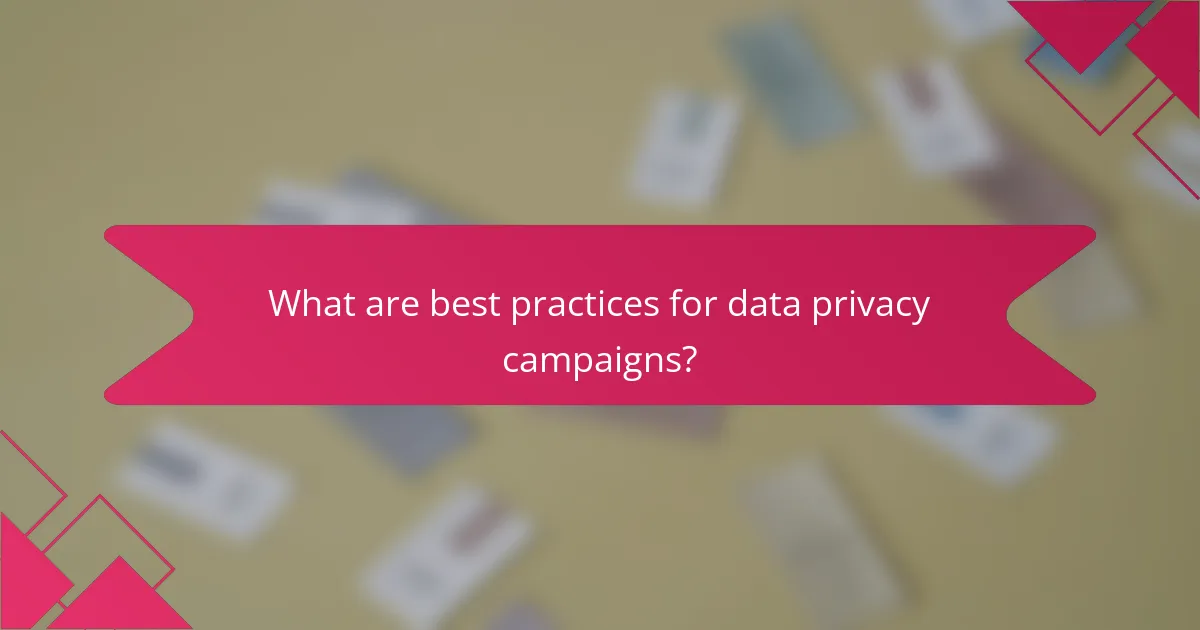
What are best practices for data privacy campaigns?
Best practices for data privacy campaigns focus on transparency, customer engagement, consent management, and ongoing compliance monitoring. Implementing these strategies helps organizations build trust and ensure adherence to data protection regulations.
Utilize transparent data collection methods
Transparent data collection involves clearly communicating what data is being collected, how it will be used, and who will have access to it. Organizations should provide privacy notices that are easy to understand and accessible to users at the point of data collection.
Consider using layered privacy notices that offer a brief summary at the top, with more detailed information available through links. This approach allows users to make informed decisions about their data without overwhelming them with information.
Engage customers with privacy awareness
Engaging customers in privacy awareness can foster trust and encourage responsible data sharing. Regularly educate customers about their rights and the measures taken to protect their data through newsletters, social media, and website updates.
Consider hosting webinars or workshops to discuss data privacy topics and answer customer questions. This proactive approach not only enhances customer relationships but also positions your organization as a leader in data protection.
Leverage consent management tools
Consent management tools help organizations obtain, track, and manage user consent for data processing activities. These tools ensure compliance with regulations like the GDPR and CCPA by allowing users to easily grant or withdraw consent.
Implementing a user-friendly consent interface can improve user experience. For instance, providing clear options for users to opt-in or opt-out of specific data uses can enhance transparency and trust.
Monitor compliance regularly
Regular compliance monitoring is essential to ensure that data privacy practices align with evolving regulations and organizational policies. Conduct audits and assessments to identify gaps in compliance and address them promptly.
Establish a schedule for periodic reviews of data handling practices and training for employees on data privacy. This ongoing vigilance helps to mitigate risks and maintain customer trust in your data protection efforts.
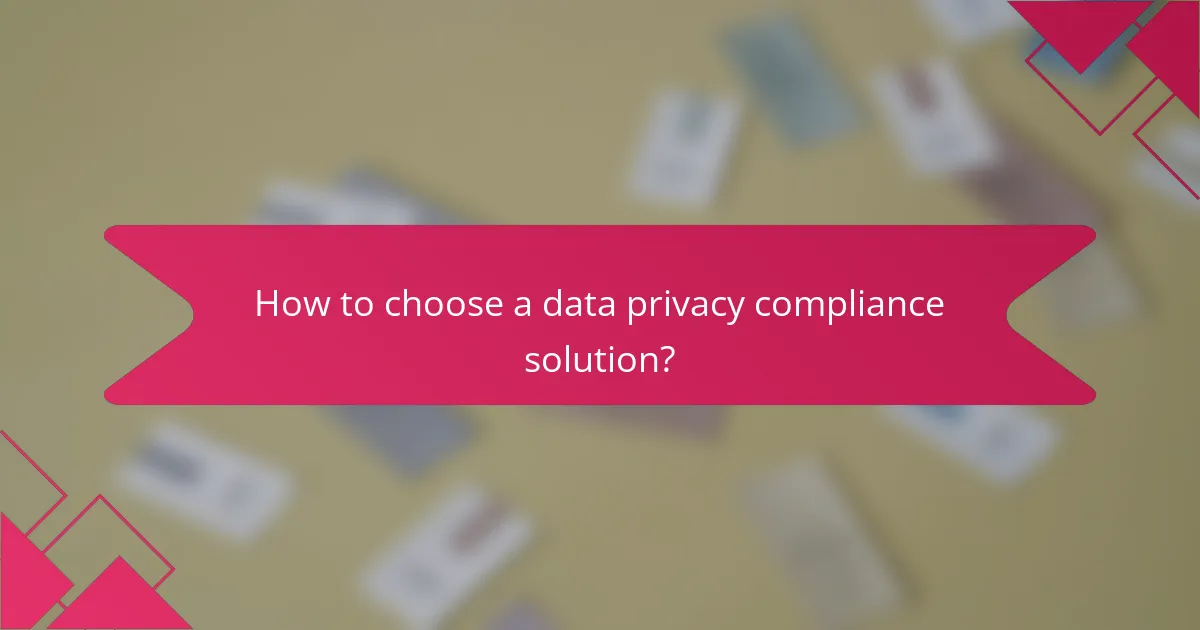
How to choose a data privacy compliance solution?
Choosing a data privacy compliance solution involves evaluating software features, vendor reputation, and integration capabilities. A well-selected solution should align with your organization’s specific needs and regulatory requirements.
Evaluate software features
When assessing software features, prioritize functionalities that support your compliance goals. Look for tools that offer data mapping, consent management, and reporting capabilities to ensure you can effectively manage personal data.
Consider whether the solution provides automated compliance checks and alerts for potential breaches. This can save time and reduce risks associated with non-compliance.
Consider vendor reputation
Vendor reputation is crucial when selecting a compliance solution. Research customer reviews, case studies, and industry ratings to gauge the reliability and effectiveness of the vendor’s offerings.
Engage with current users to understand their experiences, particularly regarding customer support and software updates. A reputable vendor should have a proven track record in data privacy compliance.
Assess integration capabilities
Integration capabilities are essential for ensuring that your compliance solution works seamlessly with existing systems. Evaluate how well the software can connect with your current data management tools and platforms.
Check for compatibility with common data sources and formats, as well as APIs that facilitate data exchange. A solution that integrates easily can enhance efficiency and reduce the risk of data silos.
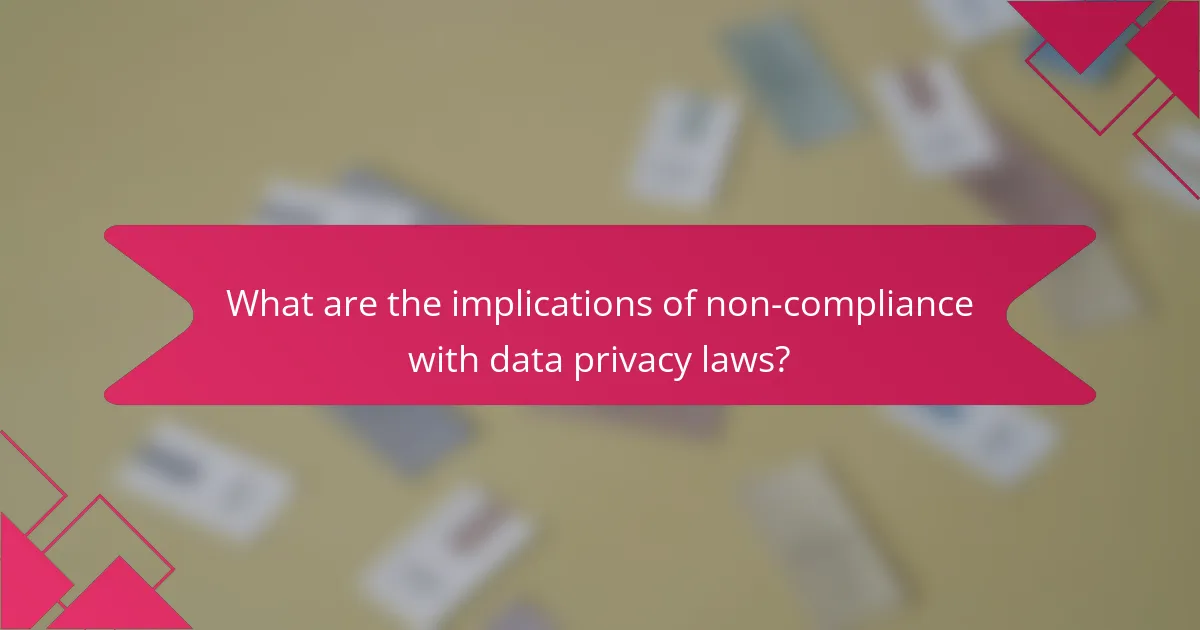
What are the implications of non-compliance with data privacy laws?
Non-compliance with data privacy laws can lead to significant legal and financial repercussions for organizations. These implications often include hefty fines, legal actions, and damage to reputation, which can affect customer trust and business operations.
Legal consequences
Organizations that fail to comply with data privacy laws may face legal actions from regulatory bodies or affected individuals. Fines can vary widely, often reaching into the millions of dollars, depending on the severity of the violation and the specific regulations involved, such as GDPR in Europe or CCPA in California.
In addition to fines, companies may also incur legal costs associated with defending against lawsuits. This can strain resources and divert attention from core business activities, impacting overall performance.
Financial penalties
Financial penalties for non-compliance can be substantial, with some regulations imposing fines that are a percentage of annual revenue. For instance, under GDPR, fines can reach up to 4% of a company’s global turnover or €20 million, whichever is higher.
Organizations should also consider the potential costs of remediation efforts, which can include updating systems, training staff, and implementing new compliance measures. These expenses can add up quickly, making proactive compliance a more cost-effective strategy.
Reputational damage
Non-compliance can severely damage an organization’s reputation, leading to loss of customer trust and loyalty. Customers are increasingly aware of data privacy issues and may choose to take their business elsewhere if they feel their data is not being handled responsibly.
Rebuilding a tarnished reputation can take years and often requires significant investment in marketing and public relations efforts. Companies may need to demonstrate their commitment to data privacy through transparency and improved practices to regain consumer confidence.






